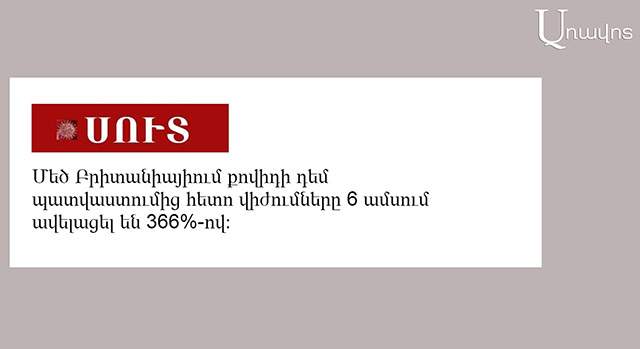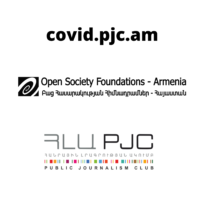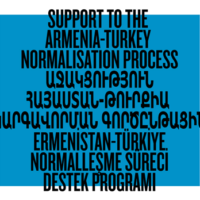
Myths and Truths about COVID-19 Vaccines
- December 5, 2021
- Category: News
The article is available here.
_____________
We have checked the most popular false and manipulative claims about COVID-19 Vaccines.
The first cases of the COVID-19 were confirmed in the fall of 2019. By April 2020, the coronavirus had already evolved into a global pandemic. In Armenia, the first case of Covid-19 infection was confirmed on March 1, 2020.
Before a vaccine would be developed for the fight against the virus, various myths and disinformation were already circulating on the Internet and news outlets regarding the epidermic. But the introduction of the first the vaccine did not seem to change much as new unfounded myths and false, manipulative claims unverified by any of the acclaimed scientific bodies began to flood the Armenian and global discourse.
The vaccination campaign in Armenia is now progressing at full speed, but this group periodically creates and disseminates false claims regarding the vaccines. There are a number of anti-vaccination pages and groups in the Armenian domain of Facebook that put out false news by making vague references to similar movements operating abroad. These pages are followed by tens of thousands of users.
As of November 14, 11% of the population in Armenia has been fully vaccinated and 23% has received their first dose. On November 16, there were 572 new confirmed cases of infection and 52 deaths.
 Aravot.am has checked the most widespread manipulative false claims that have been in circulation recently. We have interviewed the dean of the Department of Public Health of the American University of Armenia, Professor of Public Health, Dr. Varduhi Petrosyan and collated scientific evidence from studies conducted by the most esteemed scientific institutions working on healthcare research. (Misleading information: “Any person who was infected with the virus and has recovered possesses a stable and long-lasting immunity against it. Different studies have shown that this kind of inherent protection is 27 times more powerful than that created by the vaccines.”
Aravot.am has checked the most widespread manipulative false claims that have been in circulation recently. We have interviewed the dean of the Department of Public Health of the American University of Armenia, Professor of Public Health, Dr. Varduhi Petrosyan and collated scientific evidence from studies conducted by the most esteemed scientific institutions working on healthcare research. (Misleading information: “Any person who was infected with the virus and has recovered possesses a stable and long-lasting immunity against it. Different studies have shown that this kind of inherent protection is 27 times more powerful than that created by the vaccines.”
“You can die if you put your hopes solely on your natural immunity.”
Develop immunity or get vaccinated? – a question scientists do not have a definite answer for. Studies are currently underway with no final verdict yet in the offing.
An Israeli study posits that people who have been infected with the virus and recovered build up a much stronger immunity than those vaccinated with Pfizer-BioNTech. However, the same study also found that people who had been infected and had received a single dose of the vaccine following their recovery were better protected from a recurring infection than those who had not received the dose.
Although the study successfully highlights the strength of the human immune system, experts still believe that vaccines can protect against death or severe and major courses of the illness. According to the highly favored Science Magazine, doctors and scientists warn that giving precedence to natural immunity is extremely risky, especially with the Delta strain roaming about. “We do not want people to think, ‘OK, I’d better to go out and get the virus and then put up a party to celebrate it.’ People can actually die if they contract the virus,” says Michel Nussenweig, an immunologist from the Rockefeller University studying immune responses to SARS-CoV-2.
Despite being highly impressed by the Israeli study in that it highlights the strengths of the human immune system, American scientists warn against deliberately urging unvaccinated people to catch the virus as it can result in their death. “The study indeed gives a lot of credit to the role of natural immunity but does not take into account the damage the virus does to the body and the long-term symptoms persisting after the recovery from the infection.”
In many countries, it is recommended to receive at least one dose of the vaccine following the recovery, which will further reinforce the immune system.
Rishi Goel, an immunologist from the University of Pennsylvania in Philadelphia who is also one of the members of the group of researchers studying “super-immunity” or “hybrid immunity” claims that since the beginning of the administration of COVID-19 vaccines, researchers have noticed that those who have been infected with the virus, recovered and been vaccinated demonstrate a very unusual reaction to the vaccine.
“We saw that antibodies come to an astronomical amount,” he claims.
Varduhi Petrosyan. Those who have caught the virus, recovered, and then been vaccinated have a much stronger immune system than those who never got vaccinated after the recovery. Studies carried out in the US and Israel show that if a recovered person has also been vaccinated, their chances for double infection drop by 2.5 times. And those who have not been infected at all cannot be allowed to get it naturally as it would put their lives and health at a serious risk. Given the fact that there is already valid proof that vaccination can help avoid death or the severe or very severe clinical course of the illness, people’s lives should not be put at stake if a simple vaccination could do the trick.
 Lie. There is no evidence of mass testing of Covid-19 vaccines on human beings and clinical trials have not been completed yet.
Lie. There is no evidence of mass testing of Covid-19 vaccines on human beings and clinical trials have not been completed yet.
All stages of the clinical trials of COVID-19 vaccines are completed and they have been approved by international health organizations.
This is a false claim. It was duly negated by several international fact-checking organizations. Reuters, for instance, notes that COVID-19 vaccines have passed all stages of pre-clinical and clinical trials and then supports its claim with direct references to the published results of those very trials.
The vaccines currently administered in Armenia- Moderna, AstraZeneca, Sinovac and Sinopharm- have all been approved by the World Health Organization. Sputnik-V, on the other hand, has been approved by many European, South American, and Asian countries.
The researchers of the University of Oxford claim that the first, second, and third stages of vaccine trials were carried out simultaneously without following any specific order or succession. All trials were carried out in strict compliance with the terms and regulations required for clinical testing- just like all of the vaccines that have ever been approved. All existing Covid-19 vaccines, (both the ones that have already been licensed and those that have a temporary authorization and have filed for full approval) have been tested on more than 20.000 participants, producing a large volume of research data collected over a long period of time regarding their safety and effectiveness.
Varduhi Petrosyan. The technologies employed for the development of the vaccines have been in use for at least several decades. The newest of them is around 20 years old. When the pandemic broke out, the SarsCov 2 virus was instantly sequenced by the Chinese scientists who then shared that genetic information with the rest of the world. This significantly boosted the process of developing effective and secure vaccines.
Covid-19 vaccines have undergone all stages of clinical trial. Due to the efficient cooperation between all relevant stakeholders, the studies were carried out in parallel to conserve time.
All COVID-19 vaccines now used in the world have been administered in more than 6.5 billion doses, which means that at least 3 billion people have received a second dose. The claim that clinical trials are not over yet is false news.
During the 1st and 2nd stages of trials, the testing of the vaccines was carried out with the help of volunteers. Prior to that, the vaccines were tested on animal models. In the 3rd stage of testing, however, tens of thousands of people were involved in randomized controlled trials carried in two cohorts. The participants of both cohorts shared the same characteristics. The only difference, however, was that the participants of one group were vaccinated while those of the other group were not. Such contrasting allows researchers to collect additional evidence regarding the safety and effectiveness of the vaccines.
 Lie. The long-term side effects of the vaccines have not been duly assessed.
Lie. The long-term side effects of the vaccines have not been duly assessed.
“Covid-19 vaccines are safe and effective. Long-term side effects are rare phenomena regardless of the vaccine in question.”
The US Centers for Disease Control and Prevention assures that Covid-19 vaccines are safe and very effective. They have been developed through strict clinical trials involving tens of thousands of volunteers. The Agency claims that so far, only two serious side effects have been observed- anaphylactic shock and thrombosis, both of which demonstrate an extremely low frequency of occurrence. According to the Center, only 2-5 out of 1 million vaccinated people in the United States have experienced anaphylactic shock. Anaphylaxis, however, is a severe type of allergic reaction that can be triggered by any vaccine. Once occurred, health care providers can provide immediate and effective medical care.
As of November 4, 2021, 5 out of the 15.7 million people vaccinated with the J&J/Jansen vaccine in the US have died due to thrombosis with thrombocytopenic syndrome while only 2 cases of thrombosis have been registered in the 409 million vaccination doses of Moderna. CDC warns that women aged 18-49 should be especially aware of the rare but adverse effects of the vaccine.
Long-lasting side effects from vaccines are observed extremely seldom. According to US CDC, vaccine side effects are normally observed six weeks after the administration of the vaccine.
Varduhi Petrosyan. For many years now, hundreds of different vaccines have been used in the fight against different diseases. So far, no vaccine has ever shown long-term side effects that appeared later than 28 days after the administration of the vaccine. No such cases are known to mankind.
 Lie. Vaccinated people are more likely to spread the virus because of the lack of a distinct clinical course of the illness. Those who have caught it and quarantined are less likely to spread it.
Lie. Vaccinated people are more likely to spread the virus because of the lack of a distinct clinical course of the illness. Those who have caught it and quarantined are less likely to spread it.
“Vaccinated people are less likely to infect others than unvaccinated people.”
To be able to infect others with Covid-19, one must already be infected with it. However, vaccinated people are less likely to experience a long clinical course of the disease. For vaccinated people, the infectious period lasts much shorter. This is also the reason why vaccinated people spread the virus less than those who have not been unvaccinated. Based on the study conducted in New York in August 2021, more than 96% of those infected with Covid-19 were unvaccinated. Only 0.33% of them was in fact vaccinated.
Scientists do not necessarily insist that it is impossible for a vaccinated person to spread the virus. But they corroborate that the virus is more likely to be spread by those who have not been vaccinated. This is because the chances of unvaccinated people catching and spreading the new Delta strain are much higher. This issue was also voiced by the American CDC, which confirmed that vaccinated people experience much shorter infectious periods.
Varduhi Petrosyan. The uniqueness of this virus is that long before any clinical symptoms can be observed, those infected with it can spread the virus without even knowing it. Infectivity begins at least 48 hours before the appearance of the first symptoms. This means that those who are not vaccinated can start spreading the virus 2 days before experiencing any obvious symptoms and for several days after the appearance of the first symptoms. So, by wearing a mask, we decrease the risks of infecting others by 95%. It has been scientifically proven that vaccinated people have a much lower concentration of the virus than those who have not been vaccinated. Because of this, the chances of infecting others are significantly decreases. Vaccinated people are infectious for fewer number of days than unvaccinated people.
 Lie. Since the beginning of the vaccination campaign, miscarriages in the UK have increased by 366% in the course of just 6 months.
Lie. Since the beginning of the vaccination campaign, miscarriages in the UK have increased by 366% in the course of just 6 months.
“Covid-19 vaccines do not increase the risks of miscarriage.”
According to the studies conducted at the University of Minnesota, Covid-19 vaccines do not increase the risks of having a miscarriage.
Scientists have not found any serious risks of miscarriage among women who have been administered mRNA vaccines either before or very early on during the pregnancy (i.e., before the 20th week of pregnancy). The research on the safety and effectiveness of the vaccines during pregnancy testifies that the advantages of getting vaccinated far outweigh its known and unknown risks.
The British agency regulating pharmaceuticals and medical products in the country that also monitors the side effects induced by drugs and vaccines published that the number of reported miscarriages and stillbirths do not demonstrate any specific attribution to vaccinated pregnant women. As stated by the same source, there is no observable tendency that could lead to the conclusion that the vaccines administered in the UK elevate the risks of miscarriage and stillbirth. According to the agency, the results of the six studies carried out in different parts of the world confirm that the number of miscarriages observed among vaccinated women is no different from what is commonly observed among unvaccinated women. That is to say, to deviation from the common statistics has been identified. British and American scientific organizations report that based on the results of six studies carried out in 4 different countries that involved more than 40000 pregnant women, it was found out that vaccination does not in any way increase the risks of miscarriage, premature birth, stillbirth or congenital anomalies.
Varduhi Petrosyan. Since the beginning of the vaccination campaign, large databases have been generated in the EU, Israel, the US and Canada confirming that the vaccination places no addition burden on pregnant women.
Quite recently, the Royal College of Obstetricians and Gynaecologists released an announcement confirming that vaccination against Covid-19 does not result in stillbirth, premature birth or miscarriage. There is no tangible proof that the vaccination can cause all these phenomena. There is a study where hundreds of thousands of vaccinated and unvaccinated pregnant women were contrasted. The results showed that the numbers of stillbirths, miscarriages or premature births are the same for both groups.
This implies that vaccination against Covid-19 does not contain any risk factors for miscarriage. However, it has been confirmed that pregnancy can increase the severity of the disease if and when caught. The results of the British study show that in the UK, over 20% of the extremely severe cases of the virus were unvaccinated pregnant women. Since the 5th of July, every fifth Covid-19 patient receiving supplemental oxygen was an unvaccinated pregnant woman. 32% of all the women aged 16-49 receiving treatment in the intensive care unit due to the extreme severity of the disease were pregnant women. This shows that for pregnant women, the course of the disease is often extremely severe. In Armenia, 6 cases of Covid-19-induced maternal deaths have been recorded so far. What should really be feared is the virus that can actually cause premature birth, stillbirth, miscarriage and maternal deaths. All measures must be taken to protect pregnant women from catching the virus. British experts are literally pleading pregnant women to get vaccinated as soon as possible.

Lie. It is not recommended to conceive a child for 1.5 years after the vaccination.
“Women can plan to become pregnant any time after the vaccination.”
According to the Royal College of Obstetricians and Gynaecologists, a study involving 100.000 pregnant women in England and Scotland and 160.000 in the US showed that vaccination does not cause any harm to the fetus or the infant.
The US CDC strongly recommends couples who are trying to conceive to get vaccinated against Covid-19.
According to the same source, vaccines against Covid-19 do not cause an infection in anbody, including pregnant women and their feti. On the contrary, it is very useful for breastfeeding mothers as it protects them from catching the virus. According to a study conducted in the US, the breast milk of breastfeeding mothers who have been vaccinated with an mRNA vaccine contains the antibodies that can also protect their offspring. Researchers warn, however, that in order to find out if the antibodies contained in the breast milk are sufficient for protecting the babies against Covid-19, additional tests are required.
According to the guidelines of the Royal College of Obstetricians and Gynaecologists, 1. Covid-19 vaccines are recommended for administration during pregnancy. 2. Vaccination is the most efficient way to be protected from Covid-19 during the pregnancy- both for the mother and for the infant. 3. Breastfeeding does not have to be interrupted for the mother to be able to get vaccinated. 4. Women who are planning to conceive do not need to avoid getting pregnant after they have been vaccinated because there is no credible evidence that Covid-19 vaccines can in any way affect reproductive health or reduce the chances of conception.
Varduhi Petrosyan. There is no real need to wait for 1.5 years after the vaccination before one can get pregnant. Women can plan their pregnancy any time after the vaccination. However, it is important to get vaccinated before getting pregnant to eliminate all risks of possible complications. In the past when there was very little scientific evidence, worrying about the pregnancy was a necessity. However today, we have an ample amount of information regarding the impact of the vaccination on the course of pregnancy that put the rumors concerning the 1.5-year wait to rest.

Lie. The substance of the vaccine is accumulated in the vagina and men’s testicles. Vaccines affect reproductive health and cause infertility.
“Vaccines are safe for reproductive health.”
There is no valid proof in the world today that Covid-19 vaccines can have a negative impact on the human reproductive health.
This false news has already been checked by FactCheck.org, the renowned American fact-checking project. It is said in the article that none of the existing vaccines have had a negative effect on men’s semen.
According to the source, the false news epidemic regarding male infertility was sparked by an article published on Daily Expose on May 23. The article was headlined as follows: “Covid-19 Vaccines Can Cause Mass Male Infertility”. The website cited Canadian pathologist Roger Hodkinson’s interview where he calls Covid-19 “the greatest folly” by comparing it with the flu. In the interview, the pathologist claims that the “protein spike contained in the vaccine can affect the placenta and the testicles, potentially killing the unborn fetus right in the womb and leave men sterile.”
FactCheck.org quotes a number of internationally recognized studies and doctors, claiming that researchers have not observed “a noticeable decline in the sperm count” after vaccination. In like manner, the researchers at the University of Miami have collected semen samples before the first dose and after the second dose of Pfizer/BioNTech and Moderna vaccines and have found that the sperm volume, concentration, and count have remained unchanged in all of the given parameters. The researchers have come to the conclusion that all of the vaccines are completely safe for men’s reproductive health. A similar study was conducted by Israeli scientists. Here again, the conclusion was the same: Covid-19 vaccines are indeed safe for male reproductive health.
German medical researchers believe that if the immune response triggered by the vaccine were in fact capable to cause infertility among women, then the same outcome could just as well be expected from the virus itself. The German study comes to assert the conclusion of the aforementioned studies that Covid-19 vaccines are fully safe for human reproductive health.
Medical research has shown that Covid-19 has a negative effect on male and female reproductive health.
Varduhi Petrosyan. This is just one of the many ludicrous claims currently in circulation. A doctor came to this conclusion because they thought the structure of the virus was very similar to that of a certain group of proteins. Scientists, however, challenged the thesis and successfully refuted it, proving that no such thing is scientifically possible- neither in theory, nor in practice. This was done by contrasting the number of cases of infertility found among vaccinated young men with that observed among unvaccinated men of the same age. Studies have already confirmed that the Covid-19 virus adversely affects male and female reproductive health. Numerous studies carried out in China and Europe show that the virus can impact both the quality and quantity of semen and even cause erectile dysfunction.
US CDC assures that no study has yet provided sufficient evidence that Covid-19 vaccines can affect human reproductive health. The source even shows that a large number of women have successfully conceived after being vaccinated, including those who received the vaccines when they were still undergoing clinical trial.
Today, however, scientists recommend vaccinating all people above the age of 12, including pregnant and breastfeeding women as the vaccines are truly very safe and effective. The virus is what should be feared as it has the capacity to leave a negative mark on human health. It is sure to even cause long-term damages that are otherwise known as “longCovid”.
Nelli Babayan
_____________
This fact-checking article was prepared within the framework of the “Media literacy for the disadvantaged in society” project implemented by DVV International Armenia and Public Journalism Club with the support of the German Ministry of Foreign Affairs.





